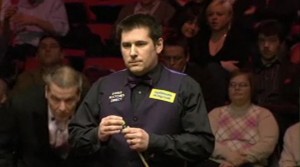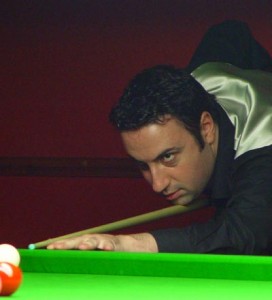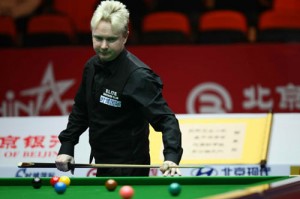
For those new to the tour, the changes to the rankings this season have been a major positive, allowing them to move up the lists quicker than they might have done in the past. What though about those on the other side of the coin, those whose places they are taking? Click below for a few thoughts on how others have lost out as a result of the changes…
It has often been said this season, both here on this blog and elsewhere that one of the major improvements to the tour in 2010/11 has been that those players who win matches receive a more immediate reward for it than in the past as far as their ranking is concerned.
Take the example of Alfie Burden, back on the tour this season after a two-year absence. Following a series of good results early in the campaign he was able to move straight up into the top 64 by October, reducing the amount of matches he needed to win in order to qualify for the venues in almost no time. Jack Lisowski and Anthony McGill too are other players up inside the top 64 who would not otherwise be there at this stage of the season.
The flip side to that however is of course that those who do not win matches, or perhaps more to the point those who did two seasons ago, face an immediate drop down the rankings. While it has always been the case that if you do not win, you fall down or even out of the rankings as for example John Parrott did last season, this process has now clearly been accelerated.
The two most obvious examples of this of course are Jimmy Michie and Paul Davies, two long-established players who having generally struggled for wins for 2-3 years now have seen their rankings plummet down and outside of the top 64. Following their decisions not to enter the remaining events of the season it would appear as though both have accepted that they are highly unlikely to get back into the top 64 before the end of the season and have decided to hang up their cues. If they wish, they can of course enter the Q School this May and attempt to win back their places that way.

Michael Judge
Other players in a similar predicament but who have decided to see out the campaign are Michael Judge and Joe Delaney, while Stuart Pettman’s provisional position has also taken a sudden drop following the removal of his points from the 2009 China Open.
In the past players struggling in this way have been able to stay on the tour via the occasional round one victory or run to a venue, but following the introduction of the PTC this is just not possible anymore. Stuart for example would probably be fine based on his performances in major ranking events alone, but following his decision to largely avoid competing the in the PTC now finds himself down in 78th place at the time of writing.
Take even Rod Lawler who while looking reasonably well placed to remain on the tour, currently finds himself down in 58th. Looking at his results however, it is quite clear that at major tournaments he is still very much a match-winner and arguably a top 48 player, but he is just giving away so many points on the PTC relative to those around him.
To me the tour as a whole is right in the middle of a transitional period at the moment, more so than it has been for many a year. We will further see the effects of this in a year’s time when the rankings will incorporate two full seasons of PTC points. Then there will be nowhere to hide for those who have either struggled on it or decided to ignore it for whatever reason.
And this effect will not just be felt lower down the rankings, but higher up too. The most obvious example this season of course is Liang Wenbo who having made it into the top 16 at the end of last season, started off this campaign badly and soon slipped back out, losing out on a spot at the Masters and a seeding at the Crucible. The likes of Stephen Hendry and Mark King are also likely to suffer, as well as Ronnie O’Sullivan.

Stuart Pettman
Is this a good thing? There are some players who have been quoted as being against the greater fluidity in the rankings, notably Stephen Hendry and Martin Gould (see here), who believe that those who have earned the higher rankings should be entitled to keep that ranking for a full season.
Despite that, as an outsider I do feel that the new system is an improvement. It is logical to me that those who are regularly winning matches do experience a more immediate gain as is seen in almost every other sport that I can think of.
The nature of the previous system combined with the lack of events in the past has protected certain players for too long at the expense of those trying to break through into the game and it is probably good to see that effect diluted to some extent.
And what is even better, at least those who do fall off the tour no longer have to waste a year unable to get back on, now able to regain their place via the Q School with immediate effect.